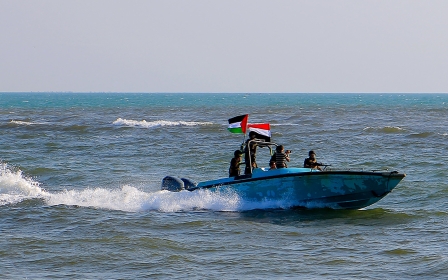US officials grilled over lack of congressional approval for Houthi strikes

The Biden administration came under fire from lawmakers on Tuesday over the lack of congressional approval to conduct military strikes against Yemen’s Houthis and defend foreign ships in the Red Sea.
“There is no existing law that would permit military action against the Houthis,” Democratic Senator Chris Murphy said at Tuesday’s Senate hearing in Washington DC.
“For the military campaign to continue, I believe that a tailored, time-bound congressional authorisation isn’t just nice to have. It is required,” he said.
Since 11 January, the US and UK have hit over 230 Houthi targets in Yemen - including attack boats, helicopters, air defence systems, and missile storage facilities. The US is also leading Operation Prosperity Guardian, a naval task force designed to step up policing in the Red Sea.
President Biden himself has said the strikes have failed to deter the Houthis and that he expects them to continue targeting vessels in the Red Sea. He has vowed to press ahead with the military campaign without providing an end date.
Stay informed with MEE's newsletters
Sign up to get the latest alerts, insights and analysis, starting with Turkey Unpacked
The White House has justified its right to launch the strikes based on Article II of the US Constitution, which gives the president authority to use military force without congressional approval for defensive purposes.
But in January, four senators - Democrats Tim Kaine and Chris Murphy, and Republicans Mike Lee and Todd Young - sent a letter to Biden asking him to define the military campaign, including how the right to self-defence justified protecting the commercial vessels of foreign nations.
'Not self-defence'
On Tuesday, Young pressed Daniel Shapiro, the deputy assistant secretary of defence for Middle East Policy, on the topic.
When Shapiro deferred to Defence Department lawyers, a frustrated Young asked, “Did you not anticipate questions about the legal rationale before you came before the sub-committee?”
'Taking offensive actions to degrade Houthi capacity, while it might strategically be a smart thing to do, that’s not self-defence'
- Democratic Senator Tim Kaine
Senator Tim Kaine said he had “grave scepticism” about the president’s legal authority to conduct the strikes and that it was “laughable” to call them self-defence.
“Article II self-defence means you can defend US personnel, you can defend US military assets, you probably can defend US commercial ships, but the defence of other nations’ commercial ships in no way, and its not even close, that’s not self-defence.”
“While it might strategically be a good idea, there is no constitutional authorisation that would allow the president to do that unilaterally. And taking offensive actions…to degrade Houthi capacity, while it might strategically be a smart thing to do, that’s not self-defence.”
The hearing comes as the Biden administration looks to address another potential obstacle to the strikes stemming from the Vietnam-era War Powers Resolution, which was passed by Congress to rein in the military power of the executive branch. The law says the president must stop military action after sixty days unless it is authorised by Congress.
Counting down from 11 January, when Biden notified Congress, that would give the administration barely two weeks to continue military action. Kaine raised concerns about reports of the potential legal justifications the Biden administration was weighing to continue the strikes.
One example that has been cited are loopholes used by the Reagan administration during the 187-1988 Persian Gulf tanker wars to justify deploying military force without congressional approval to protect commercial shipping.
Middle East Eye delivers independent and unrivalled coverage and analysis of the Middle East, North Africa and beyond. To learn more about republishing this content and the associated fees, please fill out this form. More about MEE can be found here.




